
Abijah Perkins Marvin (February 1, 1813 - October 19, 1889) was an American minister, writer, and teacher. He was a member of the Massachusetts Constitutional Convention of 1853, and a member of the New England Historic Genealogical Society.

Abijah Perkins Marvin (February 1, 1813 - October 19, 1889) was an American minister, writer, and teacher. He was a member of the Massachusetts Constitutional Convention of 1853, and a member of the New England Historic Genealogical Society.
Abijah Perkins Marvin was born in Lyme, Connecticut, February 1, 1813. He was the son of Asahel and Azubah (Still) Marvin, and was descended from Reynold Marvin, who came from England to Hartford, Connecticut, in 1636, and was afterwards of Lyme. He attended the district school in Lyme, until he was fourteen years old; the next six years he spent in printing offices, doing all parts of the work. He fitted for college at the high school in Brattleboro, Vermont, and graduated at Washington (now Trinity) College in Hartford, in 1839. He took his Master's degree in course.
Marvin taught in schools of all grades, district, high, and private, in the academy, and as a tutor in college. He taught a public school in Delaware, in 1832-1833, and a private school in Virginia, in 1840-1841. He studied theology at New Haven, graduating from the seminary there in 1842. He was ordained, in 1844, pastor of the Congregational Church, Winchendon, Massachusetts, and held this charge until 1866.
Marvin served for a year or two as agent of the American Congregational Association, and collected money for the purchase of a Congregational House. He was associate editor of the Boston Recorder , in 1867; and was at Worcester, without charge, in 1869-1870. He served as acting pastor of the Congregational Church in Lancaster, from 1870-1872, and was installed afterwards as its pastor. He was dismissed from this charge in 1875, but continued to reside in Lancaster. He was a member of the Massachusetts Constitutional Convention of 1853, representing Winchendon, and a Resident Member of New England Historic Genealogical Society from 1884.
Marvin married, March 5, 1845, Caroline, daughter of Micah and Roxy (Richardson) Holbrook. He died in Lancaster, Massachusetts, October 19, 1889. [1]
Besides some sermons and articles in the New Englander and Bibliotkeca Sacra, he published a "History of Winchendon," a "History of Lancaster," and a history of "Worcester in the War of the Rebellion;" he also wrote a considerable portion of the "History of Worcester County." He left the manuscript of a "Life of Cotton Mather." [1]
Marvin wrote the memoir for the posthumous publication of the poems of Nancy Amelia Woodbury Priest Wakefield which came into print in 1883.

Reverend Leonard Bacon was an American Congregational preacher and writer. He held the pulpit of the First Church New Haven and was later professor of church history and polity at Yale College.

Lyme is a town in New London County, Connecticut, United States, situated on the eastern side of the Connecticut River. The population was 2,352 at the 2020 census. Lyme is the eponym of Lyme disease.

Winchendon is a town in Worcester County, Massachusetts, United States. The population was 10,364 at the 2020 census. The town includes the villages of Waterville and Winchendon Springs. A census-designated place, also named Winchendon, is defined within the town for statistical purposes. The Winchendon State Forest, a 174.5 acres parcel, is located within the township as is Otter River State Forest; both recreational areas are managed by the Massachusetts Department of Conservation and Recreation.
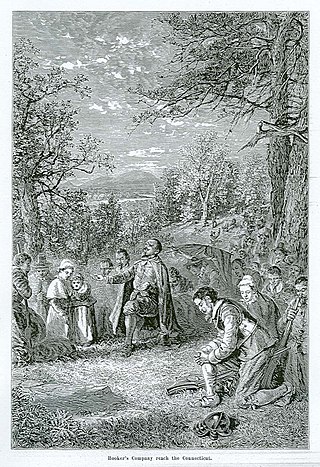
Thomas Hooker was a prominent English colonial leader and Congregational minister, who founded the Connecticut Colony after dissenting with Puritan leaders in Massachusetts. He was known as an outstanding speaker and an advocate of universal Christian suffrage.
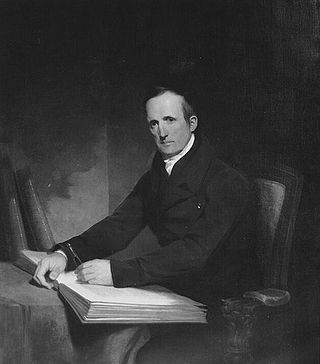
Jeremiah Day was an American academic, a Congregational minister and President of Yale College (1817–1846).

Manasseh Cutler was an American Congregational clergyman involved in the American Revolutionary War. He was influential in the passage of the Northwest Ordinance of 1787 and wrote the section prohibiting slavery in the Northwest Territory. Cutler was also a member of the United States House of Representatives. Cutler is "rightly entitled to be called 'The Father of Ohio University.'"
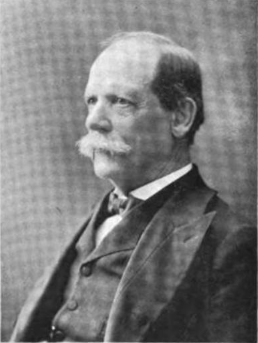
Leonard Woolsey Bacon was an American clergyman, born in New Haven, Connecticut. He was a social commentator and a prolific author on religious, social, and historical matters. In social, political, and religious issues of his times, he often broke with the traditions of his countrymen, sometimes causing "great sensation."

Originating in New England, one particular Beecher family in the 19th century was a political family notable for issues of religion, civil rights, and social reform. Notable members of the family include clergy (Congregationalists), educators, authors and artists. Many of the family were Yale-educated and advocated for abolitionism, temperance, and women's rights. Some of the family provided material or ideological support to the Union in the American Civil War. The family is of English descent.

Abijah Bigelow was a U.S. Representative from Massachusetts.
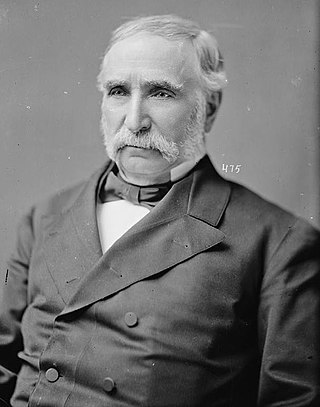
Chester William Chapin was an American businessman, president of the Boston and Albany Railroad from 1868 to 1878, and U.S. Representative from Massachusetts.
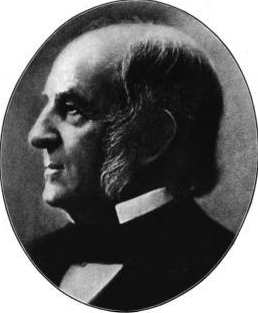
Otis C. Norcross served as the nineteenth Mayor of Boston, Massachusetts, from January 7, 1867 to January 6, 1868 during the Reconstruction era of the United States. Norcross was a candidate (1861) for the Massachusetts State House of Representatives; served as a member of the Boston Board of Aldermen from January 6, 1862 to January 2, 1865; chairman of the Boston Board of Aldermen from January 4, 1864 to January 2, 1865; and served as a trustee of the City Hospital, 1865 & 1866; and a member of the Massachusetts Governor's Council, under Gov. William Claflin (1869).
Nathan Webb, an early-American Congregational Church minister.

Timothy Swan (1758–1842) was a Yankee tunesmith and hatmaker born in Worcester, Massachusetts, USA. The son of goldsmith William Swan, Swan lived in small towns along the Connecticut River in Connecticut and Massachusetts for most of his life. Swan's compositional output consisted mostly of psalm and hymn settings, referred to as psalmody. These tunes and settings were produced for choirs and singing schools located in Congregationalist communities of New England. Swan is unique as an early American composer in that he composed secular vocal duets and songs in addition to sacred tunebook music. The tunebook, New England Harmony is a collection of his sacred music compositions, while The Songster's Assistant is a collection of his secular music. Swan was also a poet and teacher of singing.

Rev. Thomas Robbins, D.D. was a Congregational minister, a bibliophile, and an antiquarian. He became the first librarian of the Connecticut Historical Society.
Edward Woolsey Bacon was an American Congregational clergyman, as well as a sailor and a soldier.

Samuel Chenery Damon was a missionary to Hawaii, pastor of the Seamen's Bethel Church, chaplain of the Honolulu American Seamen's Friend Society and editor of the monthly newspaper The Friend.

Henry M. Francis, often known as H. M. Francis, was an architect in Massachusetts. A number of his works, alone or with sons, are listed on the United States National Register of Historic Places. His finest work may be the Murdock School in Winchendon, Massachusetts, built in 1887.

Samuel Phillips was an American Congregational minister and the first pastor of the South Church in Andover, Massachusetts. His son, John Phillips, was the founder of Phillips Exeter Academy, and his grandson, Samuel Phillips Jr., was the founder of Phillips Academy Andover and briefly the lieutenant governor of Massachusetts.
Ebenezer Burgess was the minister of the Allin Congregational Church in Dedham, Massachusetts.